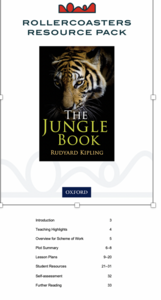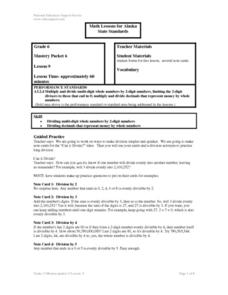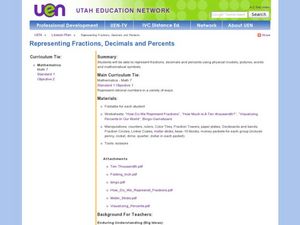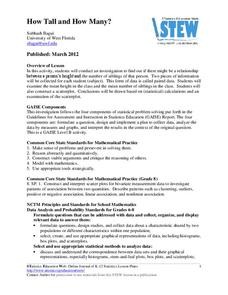Charleston School District
Pre-Test Unit 1: Exponents
How much do you know about exponents? The pre-test covers the concepts of integer exponents with both numerical and algebraic one-variable expressions. The test is also over representing numbers in scientific notation, operating with...
Illustrative Mathematics
Accuracy of Carbon 14 Dating II
The scientific issue of carbon-14 dating and exponential decay gets a statistics-based treatment in this problem. The class starts with a basic investigation of carbon content, but then branches out to questions of accuracy and ranges of...
Turabian Teacher Collaborative
My Favorite Martian: Workshopping Warrants
Sometimes explaining an argument can lead to confusion and miscommunication. Narrow down the details in written arguments with a group activity in which learners pretend to be aliens from another planet, struggling to understand each...
Oxford University Press
The Jungle Book
Most every teacher dreams of a ready-to-teach and print book study. Well, here it is! The Jungle Book novel resource includes 12 complete lessons studying poetry, author's craft, themes, characters, and more. Scholars role play, research...
Curated OER
Civil War
Historical poetry is lyrical in form and rich with content. After examining the differences between the Northern and Southern states before and during the U.S. Civil War, learners complete a Venn diagram and create an illustration of the...
Curated OER
Can You Compose?
Fourth graders investigate musical notes. In this music lesson, 4th graders compose a short song while clapping the rhythm and singing the syllables using the appropriate notes or rests.
Curated OER
Over 5 digit number word problems
In this over 5 digit numbers worksheet, students complete word problems involving numbers over 5 digits having to do with measurement, place value, and more. Students complete 10 problems.
Curated OER
Polynomials Degree and Finite Differences
In this algebra worksheet, students identify polynomials and state the degree and rewrite it in standard form. There are 32 questions ranging from polynomials to graphing a quadratic.
Curated OER
Exponents
In this exponent worksheet, learners write exponential numbers in standard form, then multiply and divide exponents.
Curated OER
Multiplying by Powers of Ten (E)
In this math learning exercise, students multiply whole numbers by powers of ten. Problems are presented in two formats, one with exponents and the second with out exponents. The first page of the learning exercise includes twenty-six...
Curated OER
Hundreds, Part 1
In this math worksheet, students examine place value models of ones, tens and hundreds. Students examine the pictures and write the numbers using words, expanded notation and standard form. There are 5 problems.
Curated OER
Solving Systems of Equations
In this systems of equations worksheet, 9th graders solve and complete 19 different problems. First, they solve each of the given equations. Then, students set the equations up in standard form and enter the coefficients of x and y. They...
Mathematics Vision Project
Module 6: Congruence, Construction, and Proof
Trace the links between a variety of math concepts in this far-reaching unit. Ideas that seem very different on the outset (like the distance formula and rigid transformations) come together in very natural and logical ways. This unit...
National Education Support Service
Division Note Cards
Sixth graders create note cards to divide multi-digit whole numbers by two-digit numbers and divide decimals that represent money by whole numbers in a simpler and faster fashion. They write the rules and examples of each on the cards...
Curated OER
Representing Fractions, Decimals, and Percents
In this fractions, decimals, and percents lessons, students explore various methods of representing fractions. They demonstrate situations that represent rational numbers. Students create a foldable exploring fractions, decimals and...
Curated OER
Putting It All Together
Young scholars examine a painting. In this shapes and puzzle lesson, students view Guston's painting Blue Water and identify the colors, shapes and recognizable forms. Young scholars work in groups to put together puzzle pieces of the...
University of Colorado
Patterns and Fingerprints
Human fingerprint patterns are the result of layers of skin growing at different paces, thus causing the layers to pull on each other forming ridges. Here, groups of learners see how patterns and fingerprints assist scientists in a...
Curated OER
Scientific Notation
Review conversion of decimal numbers into SN form with these examples of common astronomical applications and quantities. Young learners rewrite those numbers with scientific notation and with the correct units. The answers are available...
Curated OER
"Blackbeard's Ghost" Differentiated Lesson Plan
Develop a better understanding of "Blackbeard's Ghost" with this differentiated instructional activity. Working in groups on a creative project, middle schoolers can reinforce their reading comprehension and literary analysis skills. Use...
Curated OER
Take a Chance on Probability
Connect ratios, probability, and combination outcomes with a challenging activity idea. It guides your learners through probability of an event as fractions or ratios, on a number line, and with correct vocabulary. The class will be...
Curated OER
Mass Lesson
It's not just a slideshow, it's a lesson on mass. First, learners complete a mental math warm-up, where they determine the number before and after a series of given numbers, then they form groups to weigh packages and compare mass....
American Statistical Association
How Tall and How Many?
Is there a relationship between height and the number of siblings? Classmates collect data on their heights and numbers of brothers and sisters. They apply statistical methods to determine if such a relationship exists.
West Contra Costa Unified School District
Adding by finding 10's
Count with ten frames in a first grade addition lesson. Kids determine how to identify numbers on a number line, as well as with ten frames, and complete ten frames to show their answers in several addition problems.
University of Colorado
Are All Asteroids' Surfaces the Same Age?
There are more than 600,000 asteroids in our solar system. Pupils analyze images of two asteroids in order to determine if they are the same age. They count craters for each asteroid and compare numbers.

























